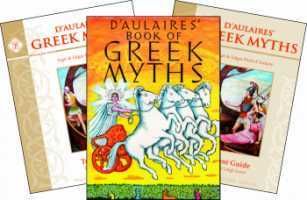
We are ending the school year soon, and I was thrilled to top off the boys' studies with something fun that they would really enjoy. I was so happy to review Memoria Press' curriculum on D'Aulaires' Greek Myths. We received the Teacher Guide, the Student Guide, The Greek Myths book, and flash cards.

My boys (and daughter) are fascinated with Greek myths. They love the stories, and are pretty well versed in the more modern spin on these ancient tales. So it was a real treat to break down the stories of the gods and goddesses. The Greek Myths book gives you a personal insight and character review of each god, goddess, and family. To see the relationships between them and the interactions between them and humans give us many entertaining stories and a greater understanding of how the ancient people who worshipped these gods explained the events in nature and in their lives.
While I reviewed this curriculum for my 2nd and 6th grader (the recommended age for this study is grades 3-6), I was not surprised by the fact that my 7th and 9th grader always showed up on the couch when this book was pulled out. Since it was the end of the school year, I didn't make the boys do the writing in the book - I did it for them. So we would go over all the questions orally, and I would write in their answers. We were very hard pressed to keep the older ones quiet and let the younger ones answer THEIR questions! I did love seeing all of them so anxious to give their answers, though, so it was all a lot of fun!
The Student Guide consists of two page lessons, usually covering two or more of the short stories from the book. The lesson is broken down into four parts per lesson: Facts to Know, Vocabulary, Comprehension Questions, and Activities. The Facts to Know give a brief definition of either a character (ie: Zeus), a place (ie: Mt. Olympus) or an object with significance in the myth (ie: the golden apple of discord). The Vocabulary section gives a sentence fragment with a vocabulary word in bold letters and a space to write what the word means. This is a great time to work on dictionary skills if your children have not used one very much. The Comprehension Questions are pretty straightforward, covering important details and events from that day's story. The Activities section had two parts. The first part was called Identify. We would go back to the Greek Myths book, look at the illustrations and find things of importance. The next part would be some more questions, but they varied. Many times they would have us compare or contrast the myths with Biblical events. Other times, the boys would be asked to draw a picture. Sometimes they would give critical thinking questions. These activities were very good for the kids. It gave us a time to have longer discussions and gave me a chance to answer some of their questions.
After every five lessons, there is a review day. I didn't expect these days to be nearly as fun on their own since I am not required to read to them on review days, so I just began a daily lesson with the review questions when they came up! It was another rocket volley of everyone shouting out their answers. At the back of the book is a final review section. The Activities section would have us go and fill these parts out as we came upon them in the stories. There are 110 drill questions and a final study sheet, as well as maps and a pronunciation guide. We haven't used the flash cards yet, but I know they will be a great help to keep all the information they learned sorted for their final review.
This study of Greek Myths from Memoria Press was so well put together. It was detailed, informative, and it covered so much. I am glad we had the opportunity to use this curriculum. It took something my kids already enjoyed and stretched their language art skills without them even knowing. I hope to have more of this kind of learning with the boys in the future.
 |
| Caleb's favorite stories were about Hermes - I think he felt a kinship with this charming, mischievous god! |
 |
| Castle loved the stories about all the gods, so he chose the picture of the thrones on Mt. Olympus. |
To follow Memoria Press on social media, you can follow these links:
Memoria Press sent other reviewers different curriculum. To read those reviews, click here:





No comments:
Post a Comment